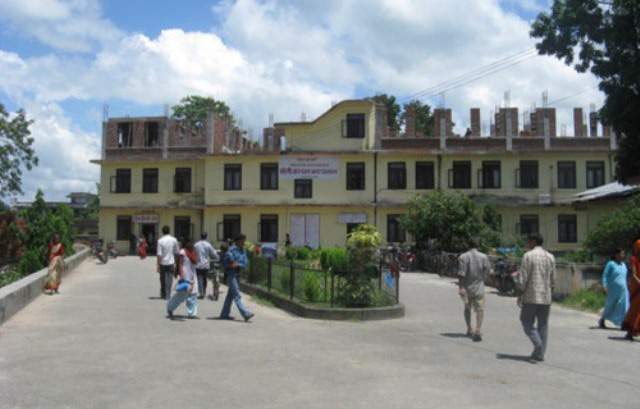Hospitals outside Kathmandu ill-prepared to fight coronavirus outbreak
- Lack protective gear, N95 masks, ICU beds, ventilators
- PPE stock in Seti Provincial Hospital won’t last even four days
Kathmandu, April 6
Dhaulagiri Zonal Hospital, where two COVID-19 patients are undergoing treatment, “is not in a position” to provide healthcare services to additional coronavirus patients, as it lacks personal protective equipment for health workers and other tools to treat infected people.
The hospital designated by the government for treatment of coronavirus disease is treating two COVID-19 patients, both females aged 19 and 65. The health of the teenager is normal, but the woman in her mid-60s might need further care because of her age and because she is taking medicines for high blood pressure.
However, the hospital has only 20 PPE, which will not last more than five days.
“It will be difficult to treat additional coronavirus patients in this condition because the stock of PPE that we have will exhaust soon while COVID-19 patients undergoing treatment in the hospital will have to remain here until they test negative,” said Sailendra BK Pokhrel, medical superintendent at Dhaulagiri Zonal Hospital.
Worse, the hospital does not have a single piece of N95 mask.
It also does not have a proper intensive care unit, where COVID-19 patients need to be kept if their health deteriorates.
Intensive care beds with ventilators are a must for COVID-19 patients if they suffer from severe acute respiratory illness following a drop in oxygen saturation level.
In severe cases, COVID-19 patients may develop acute respiratory distress syndrome, sepsis, leading to septic shoc, and multiple organ failure, including that of kidney and heart.
“But we don’t have facilities to treat patients with those health conditions. So, we can’t take any additional patient now,” said Pokhrel.
Dhaulagiri Zonal Hospital is not the only hospital designated by the government for treatment of COVID-19 that is facing acute shortage of medical and personal protective equipment to treat coronavirus patients. Others are facing the same problem.
On March 30, the government had imported medical kits to aid treatment of COVID-19 via a chartered flight of Nepal Airlines.
The consignment contained around 50,000 units of rapid testing kits, 100,000 sets of PPE, 100,000 pairs of gloves, 80,000 units of masks and 1,500 infrared thermometers.
Even after importing these goods, many hospitals at the forefront of the battle against COVID-19 are facing shortage of equipment.
Seti Provincial Hospital in far western Nepal, where four COVID-19 patients are undergoing treatment, will run out of PPE stock in the next four to five days.
The hospital has five beds in its ICU with only one ventilator.
“We are trying to add four beds in the ICU and two ventilators.
This work will be completed within a week,” said Hem Raj Pandey, medical superintendent at the hospital. The hospital also needs three anaesthetists to deliver health services to needy patients.
The added infrastructure and human resources, however, will not be adequate if the number of cases surges in the region.
Far western region in Nepal has four COVID-19 patients — half of active coronavirus cases in the country. It is also the place where the first case of local transmission of the disease was detected.
“But there are only 10 ICU beds with five ventilators at our hospital,” said Mangal Rawal, director of Karnali Academy of Health Sciences.
“At least 150 ventilators should be made available to us. We also need a testing facility as we are sending all the samples to Surkhet, which takes about nine hours to reach there.”
The medical college also doesn’t have any N95 mask.
An alarm was raised after the COVID-19 spread entered the second phase following the detection of Nepal’s first local transmission case. But hospitals that THT talked to said there were no proper plans to prevent and treat coronavirus disease.
“At least 15 persons who had returned from India are visiting our fever clinic per day these days. We need to ramp up tests to identify more cases. But we have only 30 PPE with us,” said Prakash Bahadur Thapa, medical superintendent at Bheri Hospital.
The situation is no different at Lumbini Provincial Hospital.
“We have 150 PPE and we are already using eight per day. We may not be able to provide proper treatment if the number of COVID-19 cases surges,” said Rajendra Prasad Khanal, medical superintendent at the hospital.
A version of this article appears in e-paper on April 07, 2020 of The Himalayan Times.






